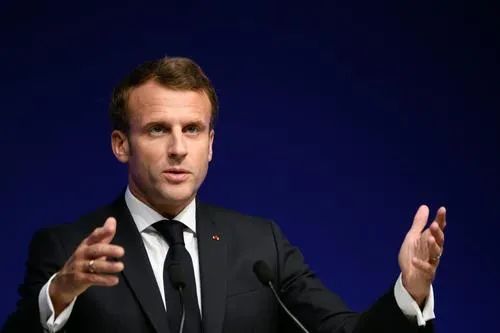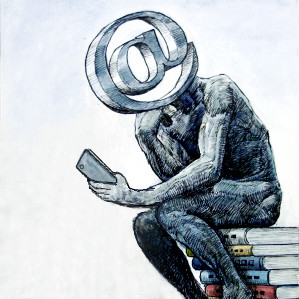炸了!马克龙演讲:资本主义已经行不通了,我们将不得不更快地投资科技革命(完整视频+全文)
翻译:报告厅翻译组
早前,不时有西方精英与平民对资本主义提出了质疑,这次,连法国总统马克龙都有些质疑了,表示“现代资本主义行不通了!”
1月26日,马克龙以视频方式参加了达沃斯世界经济论坛,并发表了主旨演讲。
马克龙在演讲后的提问环节表示:
“资本主义与市场经济为中产阶级提供了进步机会,但这个体系如今已经破败。全世界成千上万的人都存在一种感受,他们(因为失业)失去了用处。在当前的环境下,资本主义模式与开放经济行不通了,从这场疫情中走出来的唯一办法,就是打造一个更加专注于消除贫富差距的经济。”
以下为演讲全文:
施瓦布:各位与会者,我非常荣幸地欢迎法国总统马克龙先生,虽然现在我们不能面对面交流,不过,我很高兴我们能够进行线上对话来代替。总统先生,在我看来,当然也在很多人看来,您是一个有长远眼光的人,所以想就 "我们应该如何建设后疫情时代的世界 "这个话题谈一下。那我从第一个问题开始吧:在您看来,你对重建一个更绿色,更具弹性,更可持续的经济的长期愿景是什么?我们需要一个新的愿景吗?
马克龙:你好,施瓦布教授,我很高兴也通过这个视频会议见到你。非常感谢你们组织这些线上的讨论,这些讨论在这个特殊时期显得尤为重要。我想谈一谈今天的世界,它与明天的世界联系在一起,因为在我们所有的国家,社会都在通过我们正在经历的这段历程进行转型,我想我们必须记住我们在过去一年中经历的一些事情,这种状态将持续好几个月,而且根据一些人的说法,这甚至可能会持续很多年。
首先要说的是,不考虑到人的因素就不能考虑经济问题。这么说似乎有些老生常谈,但在对所有的国家而言,我们做了一些以前无法想象的事情,我们停止了所有的经济活动来拯救生命,这是第一个教训。我们记得,你所说的经济是一门道德科学,因此人们的生命比数字和金钱更重要,而且,这段时期让我们认识到了我们的脆弱性,就我个人而言,我经历过,我感染了病毒。但是其实一个组织,公司,国家也是脆弱的,我们不能不考虑到这一点。有些人比其他人更清楚这一点,但当我们思考生态和气候时,这些似乎都是遥远的想法,但这是同一个概念,真的,我们周围发生的事情对我们的日常生活有影响。它能深刻地改变一切。虽然说这句话这意味着我们的主动性不强,但我相信,在后疫情时代,我们必须从我们的经历中获益并吸取教训。我们的社会是脆弱的,因为大自然提醒着我们这一点,我们很容易受到流行病、气候事件等的影响。因此,未来的经济将因这些教训而得到加强,我们经常谈论病毒新的菌株和变种,但有些东西是不变的。未来的经济必须是一个考虑创新的经济,人类必须与气候、气候挑战、减少二氧化碳排放、适应社会、生物多样性议程一起建立竞争力,因此,经济必须更具弹性。因此,经济必须更有弹性,且必须更好的得到组织,而且必须在供应链中考虑到这些不可控的因素,我们可以稍后再谈这个问题。而且经济也必须是要考虑到人本主义的原则。我们去年就谈到了这个问题,不管是从社会的角度还是从健康的角度想,我相信我们不会走出这个疫情。或者更确切的说,我们要摆脱这场流行病,就必须有一个更注重消除不平等的经济体,基本上我可以简单说这些。
施瓦布:是的,主席先生,你去年的时候谈到过。您在国际劳工组织的会议上说过资本主义已经变得疯狂。而且在您所描述的道德经济的背景下,公司理念的作用是什么?我今天出版了一本书,叫《利益相关者资本主义》。您对此的理念是什么?您有什么看法吗?
马克龙:我理解你对利益相关者资本主义的表述,但如果你看看过去几十年,资本主义和市场经济已经证明了它们的成功。我们不能太快摧毁这里的第一块基石,我的意思是,我们知道它拯救了数百万人,使数百万人摆脱了贫困,因此它使公民和消费者能够获得商品和服务,这在过去很少发生。
然而,这一切的发生都伴随着不同社会中不平等的产生。所以这意味着一些人摆脱了贫困,进入了生产周期。但是它把其他一些人从生产周期中淘汰了出来,许多同胞尤其是要面对不同的迁移危机,因此全世界成千上万的人都面临着社会和经济冲击,失去了工作,他们有失去用处的感觉。这是一场深刻的道德和经济危机,这是过去十年资本主义的外在表现。第二个主题是价值连接与利润之间的脱节。资本主义的金融化意味着,当速度比较快的时候,如果你有相关的储蓄分配到需要资金的地方,它可以是一件好事,但是当它过度分配的时候,它就是一件坏事。有风险的资金基本上带来了与创新或工作无关的利润,事实就是这样。有这样一种螺旋造成了更多的不平等,我们在这个特殊的部门看到了更大的不平等,而社交网络的加速发展,也使得人们的想象力全球化,人们互相比较的尺度是前所未有的。基本上,这个体系有两大上帝,股东和消费者。这个系统为这两者而生,但它调整了劳动者和其他部门。我们基本上创造了气候的负外部效应,而且社会不平等危机、民主危机、民主制度的可持续性危机以及气候危机得以助长。那么,资本主义模式,再加上开放经济,就不能在这种环境下继续运作了?为什么?因为历史上它是妥协的结果,是民主社会,个人自由,中产阶级的进步带来了社会的进步。这个共识,这个平衡被这四个加速度打破了。所以我真的相信你的利益相关者资本主义,也就是说我们需要把资本主义模式的核心,对这四个问题做出回应,在过去的几年里,我们试图这样做,各个国家也试图这样做,但是单靠国家是做不到的。如果我们试图这样做,会有一个问题,因为国家将是唯一一个试图纠正外部负面的角色,因此它鼓励大量债务自行偿还,以弥补气候变化、弥补不平等。所以这个模式就会有一个压倒性的公共债务,纳税人必须为此买单。正如我们所知,纳税人是参议院久坐不动的参与者,并且他们不能享受全球化的所有好处。这就是为什么我相信人类的未来,需要通过保持某些基本的东西,如私有财产,合作,个人和集体的自由,因为这是我们社会的基石。因此,所有这些都必须促使我们重新思考我们的组织,使之回到公司和事业的核心,反对社会不平等,地区差异,以及气候后果。所以我们在过去几年所说的,经济社会和环境责任称为CSR( corporate social responsibility),基本上是企业社会责任。这些都是我们需要的创新,我们需要更进一步,我们需要从内部改革我们的公司。让所有的利益相关者,就像利益相关者资本主义一样,员工、雇主、股东,他们都需要考虑到自身行动的影响,在民主、环境还有社会等方方面面的影响。
施瓦布:主席先生,今天我很高兴地宣布几件事。我们已经宣布了私营公司的承诺,这些公司定期根据其企业社会责任和环境责任的具体和准确标准,按照所谓的ESG标准进行报告。关于环境问题,据了解,美国新一届政府,已经再次加入了《巴黎协定》。很多新的进展得以进行,但我想问你,你对目前取得的进展是否满意?或者你是否呼吁达成新的共识,超越过去所讨论的东西?
马克龙:嗯,我对此有几点看法,首先,我们已经就气候议程达成一致,有了巴黎协议。但在这一点上,我们所有人都没有履行我们的承诺。因此,我们的首要任务是尽最大努力履行我们的承诺。我想说的是,因为不可能有跟此毫无关系的人,所以我们需要共同行动,以免造成生产力偏见,这就是为什么在过去几年,当美国决定退出《巴黎协定》时,出现了重大风险。但我看到,在过去的几年里,美国退出并没有带来这一协议的崩溃。我们也创立了“一个星球”峰会,欧洲国家,很多新兴国家,包括中国也都参与了进来。我们不要忘记,这些国家合作意识很高,而且还与美国的许多联邦政府合作,现在拜登政府的第一步是再次加入《巴黎协定》。因此,我呼吁所有人,就像我们在欧洲所做的那样,尽快达到我们在未来排放方面的目标——减排55%。其次,我们承诺到2050年实现碳中和,这是近期内塑造我们行为的两个决定性里程碑。现在我们需要在地方、区域层面上应用这一点,我们需要有一个足够高的碳定价,我们需要建立机制,鼓励和邀请企业走这条路,我们需要有制裁机制,这样公司、家庭可以走得更快,我们需要改造我们的建筑、我们的汽车等等。所以这是第一个方面,这是至关重要的,第二个方面就是要把金融业和私营公司,私营企业带进来。这又回到了我们刚才所说的。我真的很相信我与主权财富基金、和私募股权公司共同设立的 "一个星球峰会 "的倡议。我相信,只有我们能够让我们的公司、我们的人民、我们的国家走上生物多样性的议程,我们才能向你们表明我们对气候的承诺。这就是我们的 “健康倡议”。因为这把反对生物多样性的气候变化的斗争结合在一起,而这正是我们目前为气候所做的,我们需要为生物多样性所做的。这就需要改变我们消费和生活方式的农业生产,所以今年,我们必须拿出共同的规则。因此,当你问,我们还需要谈判什么,所以我认为,在即将到来的峰会上,我们需要谈判的和巴黎协议一样多,但是是从生物多样性的角度展开。几天前在巴黎,我们举办了一个线上的一个星球生物多样性峰会。我们采取了几项重大举措,绿色长城就是其中之一,它横跨11个国家和非洲之角,来恢复退化的生态系统,我们还提出了很多针对生物多样性的倡议,比如推出了一项新的财务披露倡议。
施瓦布:进一步我想要对这三大方面进行提问,总统先生,如果我们采取所有这些变化,是否意味着我们将需要带来一个新的时代或全球化的新模式,全球化的新常态?
马克龙:是的。我们所说的一切都指向同一个方向。特别是三个因素,首先,我们需要建立一个新的共识。在去年11月11日的巴黎和平论坛期间,我们试图召集各国元首、非政府组织来尝试和思考我们暂且可以称之为“巴黎共识”的东西,这可以是世界任何地方的共识,这不是问题,而在想法上,我们需要超越“华盛顿共识”。我们需要超越放松管制和结束国家干预。这是我们从一开始就在进行的讨论,我们需要建立一个新的共识来整合所有这些。第二,我们需要在国家之间找到一种新的合作模式。基本上是回到一个有效的多边品牌,这是我多年来一直相信的,它受到了美国上届政府的阻碍,因为美国政府不相信它,我对我们的美国伙伴在新的一年有很大的希望,我希望他们即将与我们重新接触,我们需要为这一新共识建立一个有效的多边机制。第三,我们需要建立这些新的联盟,就是为了迎接这些挑战,我们试图在一个星球峰会上建立的联盟,也就是你提到的新常态。(信号中断)
施瓦布:总统先生. 总之,你提到的也是第四次工业革命。数字系统将带来多少新的未来,它将如何使这种对未来的憧憬更有可能?
马克龙:我想有几个,第一个是在数字时代,我们看到了许多革命,但是有几次革命同时发生。我们是技术革命的发起者,我们还有人工智能革命,这将改变生产力,并将改变从工业到医疗保健,再到空间领域的范式。除了人工智能革命,还有量子革命,计算能力将通过改变传感器行业来深刻改变我们的工业,能在航空工业,民用工业等方面有重大突破,这也意味着我们解决问题的能力,比如目前的流行病,量子智能将彻底改变我们在未来对付流行病的方式。因此,需要数周才能解决的问题将在一天内得到解决,多亏了人工智能和量子智能,诊断将能够在几分钟内完成。所以我们在这些不同的创新之间有一个融合,一方面是数字,这就是我们所说的社交网络、超连接和量子技术,人工智能和所有这些的结合意味着我们将在创新方面有一个深度突破的创新加速,我们将看到一些行业商品化和快速创造价值的能力。那么从我刚才所说的,它会有什么影响呢?首先,我们将继续创新和加速,这是肯定的。第二,在社会调整方面会产生影响,我们要从现在开始考虑。社会不平等在明天的世界将更加真实,因为我们将看到这些影响,所以我们将有这些真正的调整,我们必须从现在开始考虑。第三,它将对民主产生影响。因此,依我看来,从社会和民主的角度来看,这些将加速我们的问题。在过去几周里,我们在美国看到的情况也证实了这一点。第四,在我们制度的弹性和应对气候危机方面,我认为我们低估了创新方面的进步,这些技术将意味着我们能够更快地应对气候危机。因此,如果我们退一步,我相信我们的经济将不得不更快地投资于这些创新,我们必须努力,如果我们工作和合作的很好,那么这些创新将意味着我们能够创造价值,我们能够应对经济挑战。我真的相信,这将意味着我们能够更快地应对气候挑战,这就是为什么我相信更好的经济最好是改进,而不是停止活动。但这将导致我们国家在民主、不平等、社会不平等方面的一些问题。
施瓦布:主席先生,这是对我们未来非常全面的展望。但不管发生什么,未来都会发生,我们必须着手去建社它。我很高兴,通过你们的解释,我们看到一些人和一些领导人对如何行动以及你们对未来的看法非常清楚。以及这个未来应该做什么,它应该是什么样子,它应该如何为人类的利益而建设。非常感谢,总统先生。我很抱歉,从巴黎到日内瓦,技术可能让我们有些失望,不过,我相信,这是一个很伟大的事情来让我们能够展望未来。非常感谢,总统先生。
马克龙:谢谢教授,非常感谢。每个人都知道,有时候我们又回到了枯燥的工作中。但我觉得能够向前看一点是非常好的,而且我完全赞同你最后的话,我们不要忘了,我们的目标永远是以尊重对方的意愿,用所有的优势去建设美好的生活。而我们要为这个目标服务。
施瓦布:非常感谢,祝您在2021年万事如意,希望很快能见到你本人。
马克龙:非常感谢。

英文版:
Professor Schwab :Participants, it's my great honor to welcome Mr. President Macro. Generally, we meet in devils, nevertheless, I'm very pleased that we are able to have this digital dialogue instead. I know Mr. President that, in my opinion, in the opinion of many, you are one of those who has a long-term vision. And so I would like to talk about questions relating to “How we should be building the post-covid world.” And let me start with the first question: In your opinion, what would be your vision to rebuild a greener economy,a more resilient economy,more sustainable, so what is your vision for the long term ?Do we need a new vision?
President Macro :Hello, professor Schwab, I'm very pleased to see you also through this video conference. And thank you very much for organizing these virtual discussions that are so important in this period. I wanted to talk about today's world, and it's linked to tomorrow's world, because in all of our countries, societies are transforming through the experience that we are going through, I think we have to remember a few things from what we have been experiencing over the last year, and that is going to last many months yet, and probably many years, yet, according to what some are saying.
The first thing to say is that you cannot think economy without thinking about human beings. It might seem rather banal to say that, but in all of our countries, we've done something that was unthinkable before, we stopped all economic activities to save lives. That was the first lesson. And we remembered that the economy that you were talking about was a moral science, and therefore the lives of people was more important than figures and money, and also, this period reminds us of our vulnerability, personally speaking, I mean, I experience this, I caught the virus. But also as organization, companies, countries are vulnerable means that you cannot think your organization and your countries without taking this into account. Some were more aware of this than others, but it seemed distant idea when we thought about ecology and climate, but it's the same notion, really, what is happening around us has an impact on our daily lives. And it can change things deeply. Having said that it means that we cannot build anything, I believe in the post-covid world without reaping the benefits and learning the lessons from what we have experienced. Our societies are vulnerable because nature is reminding us of this. We are vulnerable to pandemic, climate events and so on. And so the economy of tomorrow strengthen by these lessons. We talk a lot about new strains and variants, but there are some things that are not varying. The economy of tomorrow is going to have to be an economy that thinks about innovation. And humanity and it's going to have to build competitiveness together with climate, the climate challenge, reducing CO2 emissions, adapting as societies, the biodiversity agenda. So it's economy that will have to be more resilient,that will be better organized and will have to be including these elements to resistance in the supply chains, and we can come back to this later. And also, it will have to be an economy that takes into account this principle of humanity. Whether it's on a social or a health point of view, we talked about this last year, and I believe that we will not get out of this pandemic. If or rather, we will get out of this pandemic only with an economy that is thinks more about fighting inequalities. This is basically, what I could say, briefly.
Professor Schwab:I believe, Mr. President, that you said last year. At the ILO meeting that capitalism had become mad. And in the context to you describe of a moral economy. What is the role of company philosophy, I published a book today called Stakeholder Capitalism. What is your philosophy on this What is your stake on this?
President Macro: I understand your expression stakeholder capitalism. But if you look at the last decades, we had capitalism and market economies have proven their successes. We cannot be too quick to destroy the first stone here, I mean, we know that it's saved many millions of people, and it took many millions of people out of poverty, so it enables citizens and consumers to have access to goods and services as it happened very few times in the past. Nevertheless, this all took place with the creation of inequalities in the different societies. So it meant that some people were taken out of poverty and it took people into the production cycle.
But it took out some others from the production cycle, and many fellow citizens had to face different crises of relocation especially, so there are social and economic shocks for hundreds and thousands of people throughout the world, who had this feeling of losing their usefulness, who lost their jobs. And it was a deep moral and economic crisis, and this was externalized by capitalism of the last decade. The second topic is the disconnection between value connection and profits. There was a financializing of capitalism, it means that it, when faster, it can be a good thing, but if you have the relevant allocation of savings to where funds are needed, but it's a bad thing when it over allocates. Funds when there is lit on risk. And it basically leads to profits that are not linked to innovation or work even, and this is what happened. There was this kind of a of a spiral, that created more inequalities, and we saw bigger inequalities in this particular sector. And with the acceleration of social networks, it also globalized the imagination with people comparing each other on scales that were not known before.
And so we created, we said, basically, there are two kings in this system, there's shareholders and consumers. And the system provided for both, but it adjusted on laborers and the rest of the planets. And we basically created negative externalities with the climate. And so these four phenomena fed the crisis of social inequalities, the crisis of democracies and the sustainability of the democratic system and the climate crisis. And so the capitalist model, together with this open economy can no longer work in this environment? Why? Well, because historically it was the fruit of a compromise which was democratic societies, individual of freedom, a progression for the middle class, which led to this progress of societies. And this consensus, this balance was broken by these four accelerations.
So I really believe in your stakeholder capitalism, meaning that we need to put back at the heart of the model, the response to these four questions, over the last few years, we've tried to do so, states have tried to do so, but states alone cannot do that. If we try to do that, we'll have a problem because the state will be the only man who tries to correct external negativity, so it encourages a lot of debts to pay on its own for the remedy to climate change, remedy to inequalities. And so you have a model where you have an overwhelming public debt and taxpayers have to pay for that.And as we know, Taxpayers are the senate sedentary actors, if you will, they cannot enjoy all the benefits of globalization. This is why I'm convinced that we will believe the future of humanity by keeping certain fundamental things, private property, cooperation, Individual and collective freedoms, which are the bedrock of our societies. So all of this must lead us to rethink our organizations to bring back to the heart of companies and undertakings. They, you know, the fight against social inequalities, the regional disparities, the climate consequences of our actions. So what we've called over the last few years, the economic social and environmental responsibility as CSR, basically, corporate social responsibility. These are innovations that we will need, we need to take, one step further, we need to reform our companies from within. So that all the stakeholders, as in stakeholder capitalism, employees, employers, shareholders, they all need, we all need to take into account the impact of the actions. In terms of democratic impact, environmental impact on social impact.
Professor Schwab :Mr. President, that, several things on today, I'm pleased to announce that. We have announced the commitment on the part of private companies, who report on a regular basis against specific and accurate criteria regarding their corporate social responsibility and environmental responsibility along the so called ESG criteria. Regarding the environment, and given to understand that the new US Administration, has joined again, the Paris Agreement. And a lot of progress has certainly been made, but I would like to ask you, are you satisfied with the progress made so far? Or do you call for a new consensus that would go beyond what's been discussed and proved in the past.
President Macro :Well, I have several comments on this, first of all, we’ve agreed on a climate agenda. The Paris agenda. And at this point, we have not lived up to our commitments, all of us. So our top priority is to do our utmost to stay true to our commitments. And I'm saying altogether, because there cannot be any freeloaders, we need to move together so as not to create, productivity biases, this is why in the last few years, when the US decided to leave the Paris Agreement, in the summer of 2017, there was a major risk. But I see that over the last few years since the House of Card did not, crumble tunnels. So we created the One planet Summit and we held study, you know, Europeans, a lot of emerging countries., China also. Let us not forget, they cooperated very much so, and also, with many federated states from the US,and now the Biden administrations first move was to join the Paris Agreement again. So I call upon everyone, as we did in Europe to revise upwards our objectives in terms of future emissions---minus 55%.
Second of all, we committed to carbon neutrality by 2050, these are the two decisive milestones in the near future to shape our behavior. Now we need to apply this at the local, the regional level. We need to have a carbon pricing that is high enough. We need to have mechanisms that encourages and invites companies to go down that road. We need to have sanction mechanisms so that companies, households can go faster, stronger, we need to renovate our buildings, our cars,etc. So this is the first pillar, and it is essential, the second pillar is about bringing with us the finance industry and private companies, the private sector. And this circles back to what we were saying.
I really believe in the initiative that I've set up with the One Planets Summit with sovereign wealth funds, acid managers and private equity players. So on December twelfth of last year, we had a virtual meeting with all these partners, and we've managed to bring under one same heading, if you will, one thing, project to.The climate financial disclosure task force,the so called CFD task force, this is a really, this is a great step forward. And so we have a great methodology. Now, investors have committed themselves to a measurement methodology, which is really what you were talking about, which we are now applying at company level. And on December twelfth last, we managed to have the companies of the cack, forty in France adopt this new methodology, so they will have to prove to the markets, to the capital markets, that they comply with these criteria. Third pillar, we need to do the same with biodiversity.I am convinced that we will only be able to state you to our climate commitments if we can embark our companies, our people, our countries on a biodiversity agenda. This is what we meant to do with one health, the one health initiative. Because this brings together the fight against a certification against climate change for biodiversity and this is what we are currently doing for climate, we need to do for biodiversity. This will entail changes in in agricultural production in the very way that we consume and live. And so this year, we have to come up with common rules. So when you ask, what more do we need to negotiate so I believe that in the coming summit, we need to be able to negotiate the equivalent of the Paris Agreement, but from biodiversity. A few days ago in Paris, we had a virtual One Planet Summit for biodiversity. We took several major initiatives, the great green wall was one of them. It straddles eleven countries of the sale and the Horn of Africa. In order to fight disertification, many initiatives also for biodiversity, and we launched a new initiative for financial disclosure.
Professor Schwab :So these are the three pillars that I would like to put forward.Mr, president, if we take all these changes, does it mean that we will need to bring about a new era or a new mode of globalization, a new normal for globalization?
President Macro :Yes, it does. Everything that we're talking about is pointing into the same direction. And three elements in particular, first of all, we need to build a new consensus on November the eleventh last during the Paris peace summit, we tried to bring together heads of states, ngos ,intellectuals to try and think about what we, modestly called the Paris Consensus, it's the consensus of everywhere, it's not the matter, but the idea was to observe, basically, that we needed to move beyond the Washington consensus. We needed to move beyond deregulation and the end of state intervention. And this is the discussion that we've been having since the beginning, we need to build a new consensus that integrates all this,Second of all, we need to find a new mode of cooperation between states. Basically to go back to an efficient brand of multilateral, and this is what I have believed in for years,it was stymied by previous US administration, which did not believe in it, I have a lot of hopes for this new year with our American partner, which I hope is about to re-engage with us, we need to build an efficient brand of multilateral and electoralism for this new consensus. And thirdly, we need to build these new coalitions, those that we try to build in One Planet Summit, which was to meet those challenges. The new normal that you mentioned.
Interpreter:And here the interpreter has no signed ,apologies. We seem to have lost President Macron.We have recovered the sound. It seems.
Professor Schwab :Mr.president. In all what you mentioned is also the Fourth Industrial Revolution. How much will the digital system bring a new future, how would it make this vision of the future more possible.
Interpreter:And it seems that we have lost President Macron. Sorry I seem to have lost you for a minute. Ah, president!
Professor Schwab :Then I can ask you, I know how interested you are in new technologies, and I was just asking you a question on the Fourth industrial revolution, but in all its different concepts, you know, the digital is playing a major role. How do you see the impact of the digital ecosystem on everything that you mentioned before?
President Macro :I think there's several, actually.The first one is that we are seeing many revolutions at the moment when it comes to the digital, but there are several revolutions rolled into one. We are the starter of a technological revolution. We have the AI, artificial intelligence revolution as well. That is going to change productivity and is going to change the paradigm from industry to health care, to space. And next to AI revolution, you'll have a quantum revolution as well. And through the computation powers is going to deeply change our industry by changing the industry of sensors. What you can do in the aeronautic industry, in civilian industries, and so on. And that means also our capacity to solve problems, the current pandemic, for instance, quantum Intelligence will completely change the way we attack on pandemics in the future. So problems that would take weeks to solve will be solved in one day. Diagnosis will be able to be made in just a few moments, thanks to AI and quantum intelligence. So we have a convergence between those different innovations, the digital on the one hand, which is what we call a social networks and hyperconnectivity and quantum technologies, and AI and the combination of all this means that we are going to have an acceleration of innovation of deep breakthroughs in terms of innovation. And we'll see a capacity to commoditize some industries and to create value very quickly. So from what I've just said, what impact will it have? Firstly, we're going to continue to innovate and to accelerate, that's for sure. Secondly, they will be impact in terms of social adjustments, and we have to think about them from now. So social inequalities will be even truer in tomorrow's world, because we will see these impacts, we will have these adjustments that will be real, and we have to consider them from today. Thirdly, it will have democratic impact. So I believe that these will accelerate our problems on a social and democratic point of view. What we’ve seen in the US showed this on the democratic side in the last few weeks and fourthly, on the resilience of our systems and the response to the climate crisis, I believe that we underestimated the advances in terms of innovation, and I think these technologies will mean that we will be able to respond to the climate crisis a lot faster. So if we step back a little, I believe that our economies are going to have to invest in these innovations faster, and we have to go for it, and if we work well and we cooperate, then these innovations will mean that we can create value and we can meet the economic challenges. And I really believe that it will mean that we can answer faster to the climate challenge. And this is why I believe in the economy of the better. And it's better to improve, rather to stop activities. But it will lead to some questions in terms of the democracies, the inequalities, social inequalities in our countries.
Professor Schwab : Mr. president, this was a very comprehensive vision of our future. But the future is going to happen no matter what, and we have to build it. And I'm very pleased that through your explanations, we see that some people and some leaders have a very clear vision of how to act and how do you think about this future. And what this future should do, what it should look like and how it should be built for the good of humanity. So thank you very much, President. I'm very sorry that technology failed us somewhat, uh, between Paris and Geneva, but nevertheless, I believe that, this was a great event, and we were able to look into the future, somewhat. Thank you very much, president.
President Macro :Thank you Professor, thank you very much. Everyone is true that sometimes we are back to the grinding stone. But I think it was very nice to be able to look forward a little bit. And I fully share your last words. Let's not forget that the target is always to build the good life with all its advantages, and with the will of respecting the other. And we have to serve this target.
Professor Schwab :So thank you very much. I wish you a very good year 2021, and I hope to see you in person very soon.
President Macro :Thank you very much.

为伟大思想而生!
AI+时代,互联网思想(wanging0123),第一必读自媒体
商务合作、投稿及内容合作,请联系后台小编
或271684300@qq.com
关注公众号:拾黑(shiheibook)了解更多
[广告]赞助链接:
四季很好,只要有你,文娱排行榜:https://www.yaopaiming.com/
让资讯触达的更精准有趣:https://www.0xu.cn/
 关注网络尖刀微信公众号
关注网络尖刀微信公众号随时掌握互联网精彩
- 1 中法元首相会都江堰 7904123
- 2 中方不接受日方所谓交涉 已当场驳回 7809758
- 3 大闸蟹为何会在欧美泛滥成灾 7714476
- 4 国际机构看中国经济 关键词亮了 7618088
- 5 家长称婴儿被褥印不雅英文单词 7522282
- 6 日方军机滋扰擅闯或被视为训练靶标 7425532
- 7 长沙一男子要取现20万 银行紧急报警 7330604
- 8 国乒8比1击败日本队 11战全胜夺冠 7234374
- 9 罪犯被判死缓破口大骂被害人一家 7136647
- 10 千吨级“巨无霸”就位 7043057







 互联网思想
互联网思想







